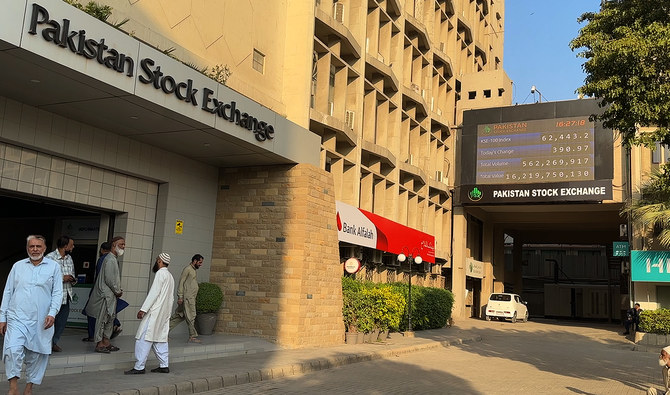KARACHI: Pakistan’s equity market on Thursday closed bearish after losing as much as around 1,000 points during intraday trading, stock traders and analysts said, as tensions escalated between Pakistan and Iran following airstrikes by both countries in each other’s territory.
Iran this week conducted an airstrike against alleged militant bases in Pakistan’s southwestern Balochistan province. Islamabad said the strike killed two children in a border village. The Pakistan military on Thursday retaliated with multiple strikes in Iran’s Sistan-Baluchestan province in an intelligence-based operation that the Pakistani foreign ministry said targeted “terrorist hideouts.”
Reacting to the mounting tensions, the benchmark KSE 100 index of the Pakistan Stock Exchange (PSX) lost more than 364 points to close at the 63,202 level at closing.
During trading, the market was down by around 1,000 points in the early trading hours but it recouped some of the losses before closing on the back of strong economic data.
Muhammad Sohail, chief executive officer of Karachi-based brokerage firm Topline Securities, attributed the drop to panic among investors over the cross-border strikes.
“Yesterday, it was expected that there will be no retaliation from Pakistan, but after the retaliatory strikes, the market is cautious and investors are selling shares,” Sohail told Arab News.
Pakistan and Iran have in the past had rocky relations, but the strikes are the highest-profile cross-border intrusion in recent years.
On Wednesday, Islamabad recalled its ambassador from Iran and barred Tehran’s envoy, who is in Iran, from returning to Pakistan.
Sohail said traders feared investing in stocks as the tensions between the two countries appeared to be escalating rather than deescalating.
“The market will set its future direction in the next few days, depending upon the reaction of the international community,” he added.
Ahsan Mehanti, CEO of Arif Habib Corporation, said amid fears of escalating tensions between Pakistan and Iran, late session support came from the strong economic data:
“Strong data on $863 million foreign Direct Investment (FDI), UAE rollover of $2 billion deposit for a year, and $397 million Current Account Surplus in December 2023 invited late session support.”
















